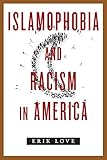Islamophobia and Racism in America / Erik Love.
Material type: TextPublisher: New York, NY : New York University Press, [2017]Copyright date: ©2017Description: 1 online resourceContent type:
TextPublisher: New York, NY : New York University Press, [2017]Copyright date: ©2017Description: 1 online resourceContent type: - 9781479804924
- 9781479803347
- 305.6/970973 23
- E184.M88 L68 2017eb
- online - DeGruyter
| Item type | Current library | Call number | URL | Status | Notes | Barcode | |
|---|---|---|---|---|---|---|---|
 eBook
eBook
|
Biblioteca "Angelicum" Pont. Univ. S.Tommaso d'Aquino Nuvola online | online - DeGruyter (Browse shelf(Opens below)) | Online access | Not for loan (Accesso limitato) | Accesso per gli utenti autorizzati / Access for authorized users | (dgr)9781479803347 |
Browsing Biblioteca "Angelicum" Pont. Univ. S.Tommaso d'Aquino shelves, Shelving location: Nuvola online Close shelf browser (Hides shelf browser)

|

|

|

|

|

|

|
||
| online - DeGruyter Evil Deeds in High Places : Christian America's Moral Struggle with Watergate / | online - DeGruyter Religion in the Kitchen : Cooking, Talking, and the Making of Black Atlantic Traditions / | online - DeGruyter Black Fundamentalists : Conservative Christianity and Racial Identity in the Segregation Era / | online - DeGruyter Islamophobia and Racism in America / | online - DeGruyter Beyond the Synagogue : Jewish Nostalgia as Religious Practice / | online - DeGruyter Stories from Trailblazing Women Lawyers : Lives in the Law / | online - DeGruyter Misogynoir Transformed : Black Women's Digital Resistance / |
Frontmatter -- Contents -- List of Figures and Tables -- List of Acronyms and Abbreviations -- Acknowledgments -- 1. The Racial Dilemma -- 2. The Racial Paradox -- 3. Islamophobia in America -- 4. Confronting Islamophobia -- 5. Civil Rights Coalitions -- 6. Toward a New Civil Rights Era -- Methodological Appendix -- Notes -- References -- Index -- About the Author
restricted access online access with authorization star
http://purl.org/coar/access_right/c_16ec
Choice Top Book of 2017 Confronting and combating Islamophobia in America.Islamophobia has long been a part of the problem of racism in the United States, and it has only gotten worse in the wake of shocking terror attacks, the ongoing refugee crisis, and calls from public figures like Donald Trump for drastic action. As a result, the number of hate crimes committed against Middle Eastern Americans of all origins and religions have increased, and civil rights advocates struggle to confront this striking reality. In Islamophobia and Racism in America, Erik Love draws on in-depth interviews with Middle Eastern American advocates. He shows that, rather than using a well-worn civil rights strategy to advance reforms to protect a community affected by racism, many advocates are choosing to bolster universal civil liberties in the United States more generally, believing that these universal protections are reliable and strong enough to deal with social prejudice. In reality, Love reveals, civil rights protections are surprisingly weak, and do not offer enough avenues for justice, change, and community reassurance in the wake of hate crimes, discrimination, and social exclusion. A unique and timely study, Islamophobia and Racism in America wrestles with the disturbing implications of these findings for the persistence of racism—including Islamophobia—in the twenty-first century. As America becomes a “majority-minority” nation, this strategic shift in American civil rights advocacy signifies challenges in the decades ahead, making Love’s findings essential for anyone interested in the future of universal civil rights in the United States.Choice Top Book of 2017 Confronting and combating Islamophobia in America.Islamophobia has long been a part of the problem of racism in the United States, and it has only gotten worse in the wake of shocking terror attacks, the ongoing refugee crisis, and calls from public figures like Donald Trump for drastic action. As a result, the number of hate crimes committed against Middle Eastern Americans of all origins and religions have increased, and civil rights advocates struggle to confront this striking reality. In Islamophobia and Racism in America, Erik Love draws on in-depth interviews with Middle Eastern American advocates. He shows that, rather than using a well-worn civil rights strategy to advance reforms to protect a community affected by racism, many advocates are choosing to bolster universal civil liberties in the United States more generally, believing that these universal protections are reliable and strong enough to deal with social prejudice. In reality, Love reveals, civil rights protections are surprisingly weak, and do not offer enough avenues for justice, change, and community reassurance in the wake of hate crimes, discrimination, and social exclusion. A unique and timely study, Islamophobia and Racism in America wrestles with the disturbing implications of these findings for the persistence of racism—including Islamophobia—in the twenty-first century. As America becomes a “majority-minority” nation, this strategic shift in American civil rights advocacy signifies challenges in the decades ahead, making Love’s findings essential for anyone interested in the future of universal civil rights in the United States.
Mode of access: Internet via World Wide Web.
In English.
Description based on online resource; title from PDF title page (publisher's Web site, viewed 06. Mrz 2024)


